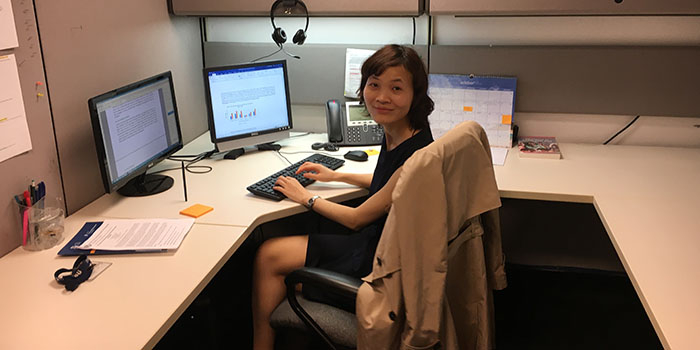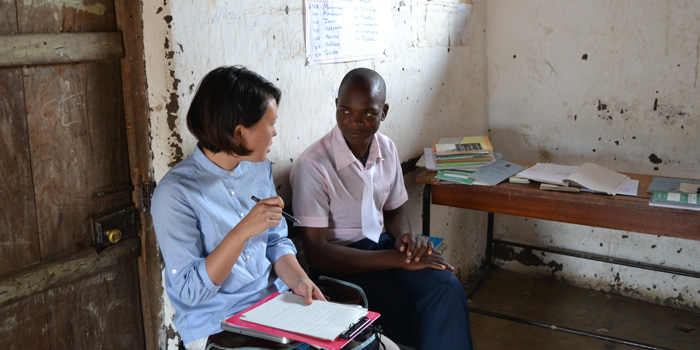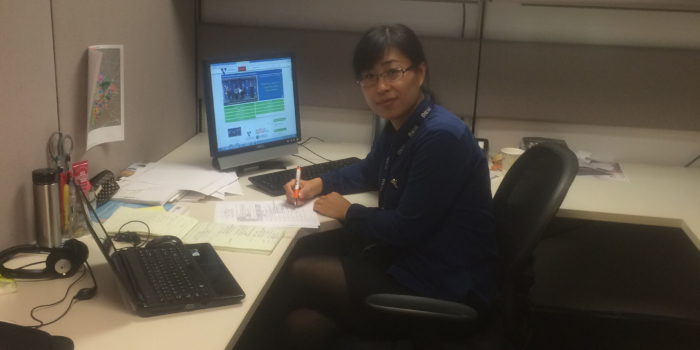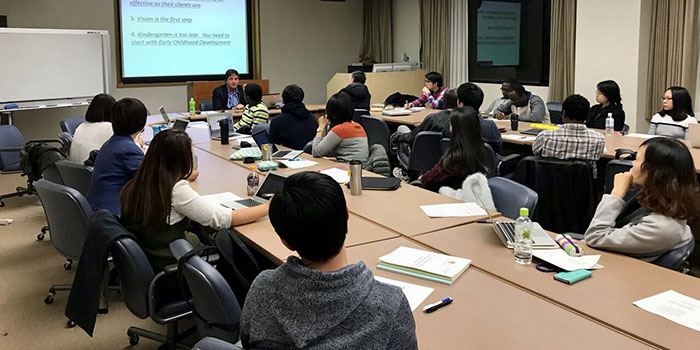Thanks to the Kobe University Visiting Scholar Program at FHI360, Washington D.C. which has been implemented for almost 11 years, I got an opportunity to conduct my summer internship in the United States during six weeks between September and October 2016. This is a great experience for me in many ways from gaining knowledge of what an NGO works in the development area, obtaining professional working skills, improving research skills to expanding professional networks internationally.
Firstly, by performing tasks assigned, attending internal meetings and conducting informational interviews with FHI360 colleagues, I could be able to on the one hand gain professional working skills and on the other hand gain a better understanding of the knowledge, skills and abilities needed for international education and international development as well as types of careers in this field so that I can better prepare for my future career. With some tasks assigned and self-reading, I am now more familiar with Stata, Nvivo and Tableau applications, which are all very helpful to aplly for my mixed-method research as well as to prepare for my future work. I will continue to sharpen my skills using these softwares when I go back to Kobe University.
To list some specific tasks, I have managed to collect administrative educational data for 22 countries and household data for 4 countries for EPDC (Education Policy and Data Center) database, thanks to which I have got to know that FHI360 has a very unique database of education of countries all over the world compared to that of UNESCO, UNICEF or World Bank. Morevoer, within a very short time, I have also had a chance to develop my academic writing skills by writing blogs for EDPC website. I drafted two blogs on international education, using Tableau for data visualization, which can be accessed here. I did also attend a number of internal meetings from weekly to monthly meetings to get to know what my colleagues at FHI360 were doing. Besides, what impressed me at FHI360 was not just a professional working climate but also a very friendly place with a bunch of kind and smart people. Fortunately, I could conduct two informational interviews with one of the experts in the field of international education, professor Mark Ginsburgh, understanding about his career path and gaining knowledge on mixed method research approach.
Secondly, by offering me chances to attend both internal topic-guided presentations at FHI360 and external workshops at other NGOs and international organizations such World Bank and Society for International Development (SID-Washington), this unique internship helped me learn about FHI360’s work in international development and what other actors in Washington D.C are doing related to global education. With three internal presentations, two panel discussions at World Bank and one discussion at SID-Washington attended, all led by experts in international edcucation and most of which have focus on early childhood education, I could have a better positioning of my research in the overall picture of global trend on early childhood development.
 Last but not least, thanks to all my time there and all the professional as well as non-professional events and activities I have participated in, I could be able to talk to a lot of experts in the field of international education and had a chance to let them know about me. My supervisor and coordinator at FHI360 highly cherished my proactiveness to reach out to people and let myself visible to potential networking people. Additionally, I could also make use of my time to travel to some places out of Washington D.C. such as New York, Boston and Pittsburgh to gain more understanding about people, culture and landscape of the United States. I would like to thank Professor John C. Weidman for hosting me in Pittsburgh, showing me around and discussed with me on my future career as well as research skills.
Last but not least, thanks to all my time there and all the professional as well as non-professional events and activities I have participated in, I could be able to talk to a lot of experts in the field of international education and had a chance to let them know about me. My supervisor and coordinator at FHI360 highly cherished my proactiveness to reach out to people and let myself visible to potential networking people. Additionally, I could also make use of my time to travel to some places out of Washington D.C. such as New York, Boston and Pittsburgh to gain more understanding about people, culture and landscape of the United States. I would like to thank Professor John C. Weidman for hosting me in Pittsburgh, showing me around and discussed with me on my future career as well as research skills.
I would like to express my tremendous gratitude to my supervisor at Kobe University, Professor Keiichi Ogawa, for making this invaluable opportunity real to me. Thank him for all his practical guidance and support throughout my academic and professional journey. I would also like to thank my seniors from GSICS who are working at the World Bank in D.C. for all their kind support to me both personally and professionally.
Finally, I highly recommend other students to take this valuable opportunity to participate in the Kobe Visiting Scholar Program at FHI360 if they plan to work in the area of international development and international education.
Authored by Nguyen Thi Thanh Huyen
Related


 Last but not least, thanks to all my time there and all the professional as well as non-professional events and activities I have participated in, I could be able to talk to a lot of experts in the field of international education and had a chance to let them know about me. My supervisor and coordinator at FHI360 highly cherished my proactiveness to reach out to people and let myself visible to potential networking people. Additionally, I could also make use of my time to travel to some places out of Washington D.C. such as New York, Boston and Pittsburgh to gain more understanding about people, culture and landscape of the United States. I would like to thank Professor John C. Weidman for hosting me in Pittsburgh, showing me around and discussed with me on my future career as well as research skills.
Last but not least, thanks to all my time there and all the professional as well as non-professional events and activities I have participated in, I could be able to talk to a lot of experts in the field of international education and had a chance to let them know about me. My supervisor and coordinator at FHI360 highly cherished my proactiveness to reach out to people and let myself visible to potential networking people. Additionally, I could also make use of my time to travel to some places out of Washington D.C. such as New York, Boston and Pittsburgh to gain more understanding about people, culture and landscape of the United States. I would like to thank Professor John C. Weidman for hosting me in Pittsburgh, showing me around and discussed with me on my future career as well as research skills.



